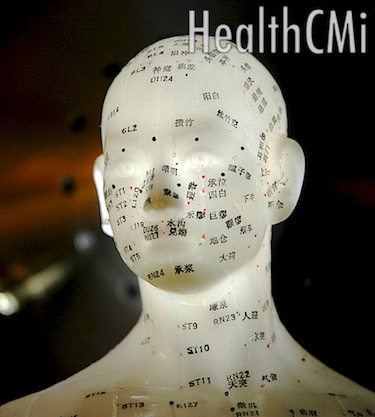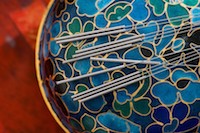Researchers conclude that acupuncture combined with herbal medicine helps to eliminate ulcerative colitis. Researchers at the Hospital of Handan City (Hebei, China) conducted a unique experiment. They wanted to know if acupuncture and herbal medicine combined with pharmaceutical medications is more effective than using only drugs.  The results were overwhelmingly supportive of adding acupuncture and herbal medicine to conventional medication protocols. The study group receiving acupuncture and herbs combined with drugs had a total effective rate of 93.1%. The group that only received drugs had a 75.86% total effective rate. The researchers concluded that acupuncture and herbal medicine consistently enhances clinical outcomes for patients with ulcerative colitis.
The results were overwhelmingly supportive of adding acupuncture and herbal medicine to conventional medication protocols. The study group receiving acupuncture and herbs combined with drugs had a total effective rate of 93.1%. The group that only received drugs had a 75.86% total effective rate. The researchers concluded that acupuncture and herbal medicine consistently enhances clinical outcomes for patients with ulcerative colitis.
The research team randomly divided 58 ulcerative colitis patients into two study groups. Group 1 received acupuncture, herbal medicine and mesalazine. Group 2 received only mesalazine. Oral administration of mesalazine enteric coated tablets at a dose of 1g per dose, 4 times daily, was given to both groups. One course of treatment consisted of eight weeks. Mesalazine (5-aminosalicylic acid) is an anti-inflammatory medication primarily used for treating inflammatory bowel diseases. Mesalazine’s primary action is in the intestines and it is used in the treatment of ulcerative colitis and Crohn’s disease.
Traditional Chinese Medicine (TCM) classifies ulcerative colitis into several categories. Heat and toxins are categorically similar to biomedical discernments of inflammation. TCM related dampness may also correlate to biomedically defined inflammation as well as suppurative lesions. Blood stasis in the TCM system relates, in part, to biomedically defined scarring, congealed tissue and poor circulation. TCM also recognizes exogenous external pathogens, dietary imbalances, stress and qi deficiency fatigue as related factors. Classical TCM texts classify ulcerative colitis in the same categories as dysentery, diarrhea, hematochezia and/or intestinal wind.
General TCM theory for the treatment of ulcerative colitis posits clearing heat, dispelling dampness, detoxifying and stopping bleeding to promote tissue regeneration. Accordingly, the researchers chose acupoints such as Tianshu (ST25). This acupuncture point regulates the Spleen and Stomach, tonifies qi, benefits the intestines and rectifies disorderly emotions. Acupuncture points used in the study were: Tianshu (ST25), Shangjuxu (ST37), Daheng (SP15), Zhongguan (RN12), Zusanli (ST36), Taibai (SP3), Shuifen (RN9), Qihai (RN 6). Baitouweng Tang (Pulsatilla Decoction), a classic herbal formula for the treatment of ulcerative colitis, was administered.
The researchers noticed a very important clinical benefit of the acupuncture and herbal medicine. Patients required less time of care when using the combined therapy. Patients receiving the drugs combined with acupuncture and herbs averaged 56 days of required care. The drug only group required 81 days of care. Even with the extra time of treatment, the drug only group had a total effective rate of 75.86% whereas the acupuncture and herbal medicine plus drug group had a total effective rate of 93.10%. Other important clinical findings demonstrated that the acupuncture and herbal medicine plus drug group demonstrated less depression and anxiety than the drug only group. As a result, the researchers concluded that acupuncture and herbs combined with mesalazine is superior to the stand-alone drug treatment in the treatment of ulcerative colitis.
In related research published in the World Journal of Gastroenterology, patients with intractable ulcerative colitis who were unresponsive to conventional drug therapy self-administered 1g of the herbal medicine Qing Dai (Indigo naturalis) powder, two times per day for four months. Six of the seven patients in the study were able to completely discontinue the use of anti-inflammatory medications including aminosalicylates, corticosteroids and azathioprine. Endoscopy and symptomatic responses demonstrated a range of improvements from completely cured to significantly improved. 
The research was prompted by a prior study showing that a Ku Shen combined with Bai Tou Weng enema in a protocol that also included acupuncture was superior to antibiotic intake for the treatment of ulcerative colitis. Additionally, electron spin resonance reveals that Qing Dai has potent hydroxl radical scavenging properties. Research also demonstrates that Qing Dai suppresses superoxide generation. The researchers were intrigued by the anti-inflammatory properties of Qing Dai. Studies demonstrate that I3M, synthesized from indirubin found in Qing Dai, downregulates cancerous tissues when applied topically to oral cancer. Research confirms that indirubin has anti-inflammatory effects by suppressing interferon-alpha, interleukin-6 and nuclear factor. Historically, Qing Dai has been an important herb in the treatment of ulcers of the mouth and tongue. Topically, Qing Dai is also prepared as a paste for the treatment of acne and psoriasis.
Reference:
Wang, Zhaoyang, et al. “Clinical effects of acupuncture with Chinese and western medicine treating on ulcerative colitis.” Medical Journal of West China 26.2 (2014): 199-203.
Suzuki, Hideo, Tsuyoshi Kaneko, Yuji Mizokami, Toshiaki Narasaka, Shinji Endo, Hirofumi Matsui, Akinori Yanaka, Aki Hirayama, and Ichinosuke Hyodo. "Therapeutic efficacy of the Qing Dai in patients with intractable ulcerative colitis." World journal of gastroenterology: WJG 19, no. 17 (2013): 2718.


